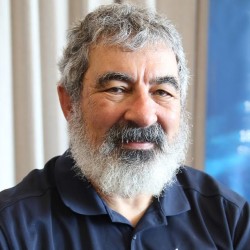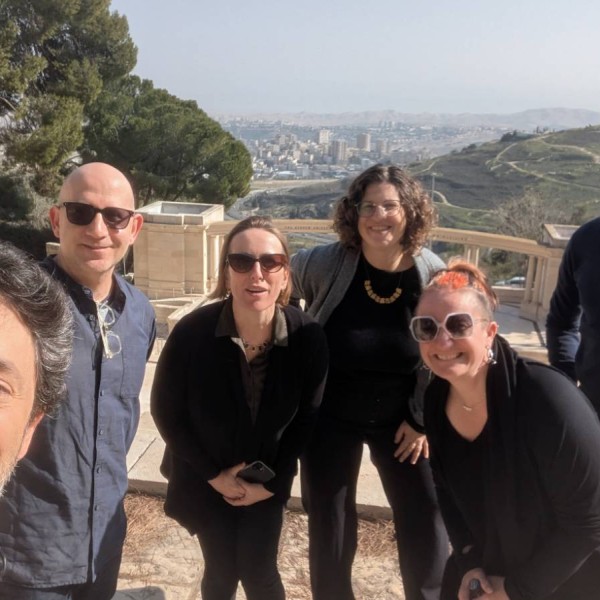Bruce Lewenstein
University Ombuds
Professor, Department of Communication
Professor, Department of Science and Technology Studies

Dr. Bruce V. Lewenstein is a widely-known authority on public communication of science and technology–how science and technology are reported to the public and how the public understands controversial scientific issues and "emerging technologies" such as biotechnology and nanotechnology. Trained as a historian of science, he often uses historical case studies in his research. He has also done extensive work evaluating "citizen science" outreach projects, in which citizens fully participate in the scientific process by gathering, entering, and sometimes analyzing scientific data. In recent years, he has helped connect the "public communication" field with the "learning sciences" field, especially around issues of public engagement in science. He works frequently with scientists learning more about public communication of science and technology.
Research Focus
I work primarily on the history of public communication of science, with excursions into other areas of science communication (such as informal science education). In general, I try to document the ways that public communication of science is fundamental to the process of producing reliable knowledge about the natural world.
Since the mid-1990s, I have spent some time as an evaluator of informal science education projects, especially in areas of “citizen science.”
During the 2000s, I spent some time exploring social and ethical issues associated with emerging technologies such as genomics and nanotechnology.
Outreach and Extension Focus
My work has two areas of impact: (1) education for practitioners of public communication of science and technology and (2) shaping of policy research on public knowledge and attitudes towards science and technology. My audiences range from local groups seeking to improve their communication, to national associations, to international settings where students and practitioners gather. Both the education and the policy work are tools of leverage, which ultimately contribute to better public understanding of science and technology.
Teaching Focus
My goal as a teacher is to help students learn to think. Yes, there's a body of knowledge I'd like them to learn, a set of skills I'd like them to take away, a particular argument I'd like them to know. But in the end, most of the students I teach won't be in positions to use that particular knowledge, those skills, or that argument. They should, however, after my courses be better able to cope with the knowledge, skills, or arguments they do face.
Education
- Doctorate, University of Pennsylvania - 1987
- Master's Degree, University of Pennsylvania - 1985
- Bachelor of Arts, University of Chicago - 1980
Awards & Honors
- PCST: Global Network for Science Communication, inaugural winner of PCST Award for the Advancement of Science Communication as a Professional Field, 2025
- SUNY Chancellor's Award for Excellence in Faculty Service (2020) SUNY
- CALS Alumni Association Outstanding Faculty Award Cornell University CALS Alumni Association, 2019
Courses Taught
As of 2025, I am no longer actively teaching classes or accepting new graduate advisees.
- Comm 1101: Cases in Communication
- Comm 2850: Communication, Environment, Science & Health
- Comm 3520/3020: Science Writing for Media
- Comm 3530/3032: Science Writing Practicum
- Comm 4660:: Public Communication of Science and Technology
- Comm 5660: Science Communication Workshop
- Comm 6660: Public Engagement in Science and Technology
- STS 7111: Introduction to Science & Technology Studies
Contact Information
462 Mann Library Building
Ithaca, NY 14853
b.lewenstein [at] cornell.edu
-
Additional Links
Selected Publications
- García-Guerrero, Miguel, & Lewenstein, Bruce V. (2020). Science recreation workshops groups in Mexico: a study on an emergent community. International Journal of Science Education, Part B: Communication and Public Engagement, 10(2), 133-148. http://doi.org/10.1080/21548455.2020.1719293
- Lopes de Oliveira, Diogo, Moreno, Erick, & Lewenstein, Bruce V. (2021). Media representations of official declarations and political actions in Brazil during the COVID-19 Pandemic. Frontiers in Communication. 6, Article 646445 (online only). http://doi.org/10.3389/fcomm.2021.646445
- Lewenstein, Bruce V. (2022, March). Is citizen science a remedy for inequality? Annals of American Academy of Political and Social Science, 700, 183-194. https://doi.org/10.1177/00027162221092697
- Lewenstein, Bruce V. (2022). What is science communication? JCOM: Journal of Science Communication, 21(7), online only. https://doi.org/10.22323/2.21070301
- Lewenstein, Bruce V., & Baram-Tsabari, Ayelet. (2022). How should we organize science communication trainings to achieve competencies? International Journal of Science Education -- Part B: Communication and Public Engagement, 12(4), 289-308. https://doi.org/10.1080/21548455.2022.2136985
- Rosin, Mark S., Storksdieck, Martin, O’Connell, Kari, Keys, Brianna, Hoke, Kelly, & Lewenstein, Bruce V. (2023). Broadening participation in science through arts-facilitated experiences at a cultural festival. PLOS ONE, 18(5), e0284432. https://doi.org/10.1371/journal.pone.0284432
- Lopes de Oliveira, Diogo, & Lewenstein, Bruce V. (2023). Activism in Latin America: The role of science communication and NGOs in socio-environmental conflicts. Journalism Studies, 25(5), 501-517. https://doi.org/10.1080/1461670X.2023.2241076
- Lewenstein, Bruce V. (2024). Science communication in a diverse world. JCOM: Journal of Science Communication, 23(5), article Y01, online only. https://doi.org/https://doi.org/10.22323/2.23050401
- Lewenstein, Bruce V., & Baram-Tsabari, Ayelet. (2024). How should we update and reorganize science communication training? An invitation to a collaborative action [authors’ response to special issue collating responses to Lewenstein & Baram-Tsabari (2022)]. International Journal of Science Education, Part B: Communication and Public Engagement, 14(4), 526-529. https://doi.org/10.1080/21548455.2024.2423069
- Massarani, Luisa, Magalhães, Danilo, & Lewenstein, Bruce. (2025). Globalizing Science Journalism: From Early Associations to the World Federation. Cultures of Science, published online ahead of print. https://doi.org/10.1177/20966083251344406
- Gascoigne, Toss, Schiele, Bernard, Leach, Joan, Riedlinger, Michelle, Lewenstein, Bruce V., Massarani, Luisa, & Broks, Peter (Eds.). (2020). Communicating Science: A Global Perspective. Canberra: Australian National University Press.
- Thackray, Arnold. (2022). Science: Has Its Present Past a Future? (J. L. Sturchio & B. V. Lewenstein, Eds.). Seavoss Associates.
- Fahy, Declan, & Lewenstein, Bruce V. (2021). Scientists in popular culture. In Massimiano Bucchi & Brian Trench (Eds.), Handbook of Public Communication of Science and Technology (3rd ed., pp. 33-52). London: Routledge.
- Lewenstein, Bruce V. (2024). Why I don’t use the label “basic science” In SciPEP (Ed.), Insights and Practical Considerations for Communicating Basic Science (pp. 40-41). Kavli Foundation/US Department of Energy Office of Science.
Bruce in the news

News

News

